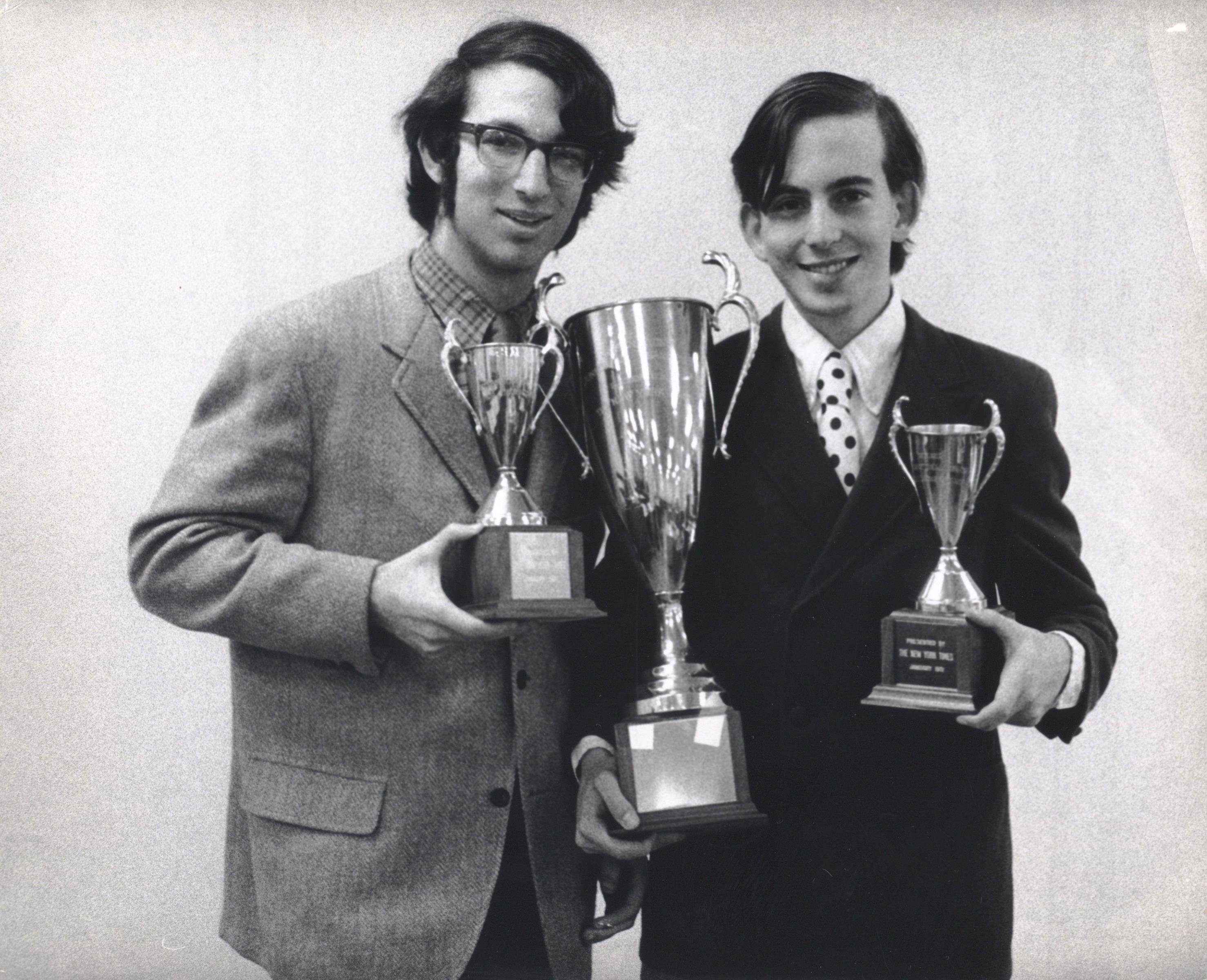M.I.T. Pair Wins First Transatlantic Junior Tournament
By Alan Truscott
The first transatlantic Junior Pairs Tournament was won by 23-year-old Michael Gurwitz of Hillside NJ and 19-year-old Mark Feldman of Cambridge MA.
The two-session event, restricted to players aged 25-years and under, was held on Saturday, January 2, 1971, in London and at the Royal Manhattan Hotel in New York. Altogether, 172 pairs took part — 70 in New York and 102 in London. The same deals (48 in all) were played at the two sites, with scoring across the field. Top on any one board was 146, yielding a 3504 average for the day. The New York Times offered its telex facilities for transmitting the scores across the Atlantic for comparison, Local results were known on the spot, and the final overall placings were available in New York early the next morning.
Gurwitz-Feldman’s score of 4559 was almost a full board better than that of runners-up Phillip Alder of Monmouth, England, a chemistry student at London University, and Ceri Evans of Hounslow, London, a student at Kingston Polytechnic. They totaled 4434. Third with 4381 were two English 25-year-olds, Bill Pencharz, a London lawyer, and Ian Panto, a Brighton businessman.
Though most of the juniors used fairly standard bidding methods, some of them were prone to experiment. For instance, the winners, both of whom are Life Masters, played “Animal Acol” — a free-wheeling American adaptation of the British system.
Consider the technique of both declarer and the defenders on this deal from the event:
| Dlr: East | ♠ K Q 4 | |||||||||||||||||||||||||
| Vul: E-W | ♥ 2 | |||||||||||||||||||||||||
| ♦ K Q 8 4 3 | ||||||||||||||||||||||||||
| ♣ A J 5 3 | ||||||||||||||||||||||||||
| ♠ J 9 8 7 6 5 2 | ♠ A | |||||||||||||||||||||||||
| ♥ K Q 5 4 | ♥ A 10 8 7 6 3 | |||||||||||||||||||||||||
| ♦ A | ♦ 2 | |||||||||||||||||||||||||
| ♣ 2 | ♣ K Q 10 9 6 | |||||||||||||||||||||||||
| ♠ 10 3 | ||||||||||||||||||||||||||
| ♥ J 9 | ||||||||||||||||||||||||||
| ♦ J 10 9 7 6 5 | ||||||||||||||||||||||||||
| ♣ 8 7 4 | ||||||||||||||||||||||||||
|
||||||||||||||||||||||||||
Opening lead: ♠9
East-West did well to reach six hearts in the face of the barrage put up by North-South. When North failed to double the opposing slam, South (Ken Lebensold of New York), decided that it was unlikely that his side held more than one defensive trick, so he opted for a sacrifice at 7♦.
West selected the ♠9 for his opening lead in order to discourage East (Steve Goldberg of Atlanta) from returning the suit. East captured dummy’s queen with the ace and shifted to the heart eight as a suit preference signal. The play was perfectly safe — South would surely not have taken a sacrifice if he held the king of his opponents’ trump suit behind the opening bidder.
In with the queen of hearts, West returned the jack of spades, both to pin the declarer’s ten and to show that he was not interested in a club return. East ruffed dummy’s king and led a second heart for dummy to ruff. Now it was declarer’s turn to shine.
It is a temptation to lead a trump at this point, but that would result in a six-trick set when West wins and shifts to a club, after which the defenders would have to come to two club tricks. Instead the declarer decided to use the missing ace of trumps for an endplay later on.
Accordingly, declarer ruffed dummy’s remaining spade and ducked a club to East’s nine, leaving the defenders without resource. East had to return the king of clubs and, as it would not have helped West to ruff with ace in front of dummy, he discarded a spade and dummy’s ace of clubs won. Now declarer led a trump from dummy to West’s ace, and that defender had no recourse but to concede a ruff-and-sluff for down only five.


